
Caregivers reported different symptom burden than child during cancer treatment
Reporting symptom burden and pain can be fairly subjective and they can become even more subjective when reported by proxy. A report examines how caregiver reports vary from a child’s report during treatment of pediatric cancer.
A cancer diagnosis in childhood leads to many radical changes for both the child and that child’s caregiver. One of the changes include asking about the health-related quality of life at every turn. A
Investigators ran a multicenter cohort study. Children who had a first cancer diagnosis and their caregivers were given a survey to complete at 2 different times: within 72 hours preceding the initiation of treatment and during the follow-up when the symptoms are expected to be worse. The data were collected from October 2016 to October 2018 from 9 pediatric oncology hospitals.
A total of 482 caregiver/child pairs were recruited for the study. The researchers found that there was moderate agreement between child self-report and the caregiver’s proxy report with mobility (0.57 [95% CI, 0.50-0.63]), but poor agreement for symptoms (range, 0.32 [95% CI, 0.24-0.41] for fatigue to 0.42 [95% CI, 0.34-0.50] for psychological stress). The children were found to report higher mobility and lower symptom burden than their caregivers reported. In the multivariable model that adjusted for sociodemographic factors, the caregivers stated that the child’s mobility scored was 6.00 points worse than what the child had self-reported during the course of follow-up (95% CI, −7.45 to −4.51), which exceeded the minimally important difference of 3 points. The caregivers also overestimated the children’s self-reported symptom levels from 5.79 (95% CI, 3.99-7.60) points for psychological stress to 13.69 (95% CI, 11.60-15.78) points for fatigue. Additionally, the caregiver’s own health-related quality of life was linked with the magnitude of difference between the child’s score and the caregiver’s score, except for mobility. With fatigue, the magnitude of difference between the scores increased by 0.21 (95% CI, 0.13-0.30) points for each 1-point increase in the caregiver’s fatigue score.
The researchers concluded that caregivers overestimate the symptoms and underestimated the mobility of children during cancer treatment and that this occurred on a consistent basis. This underscores the fact that providers should strive to get reports from the child themselves to get a clearer picture of both symptom burden and mobility.
Reference
1. Mack J, McFatrich M, Withycombe J, et al. Agreement between child self-report and caregiver-proxy report for symptoms and functioning of children undergoing cancer treatment. JAMA Pediatr. August 24, 2020. Epub ahead of print. doi:10.1001/jamapediatrics.2020.2861
Newsletter
Access practical, evidence-based guidance to support better care for our youngest patients. Join our email list for the latest clinical updates.






